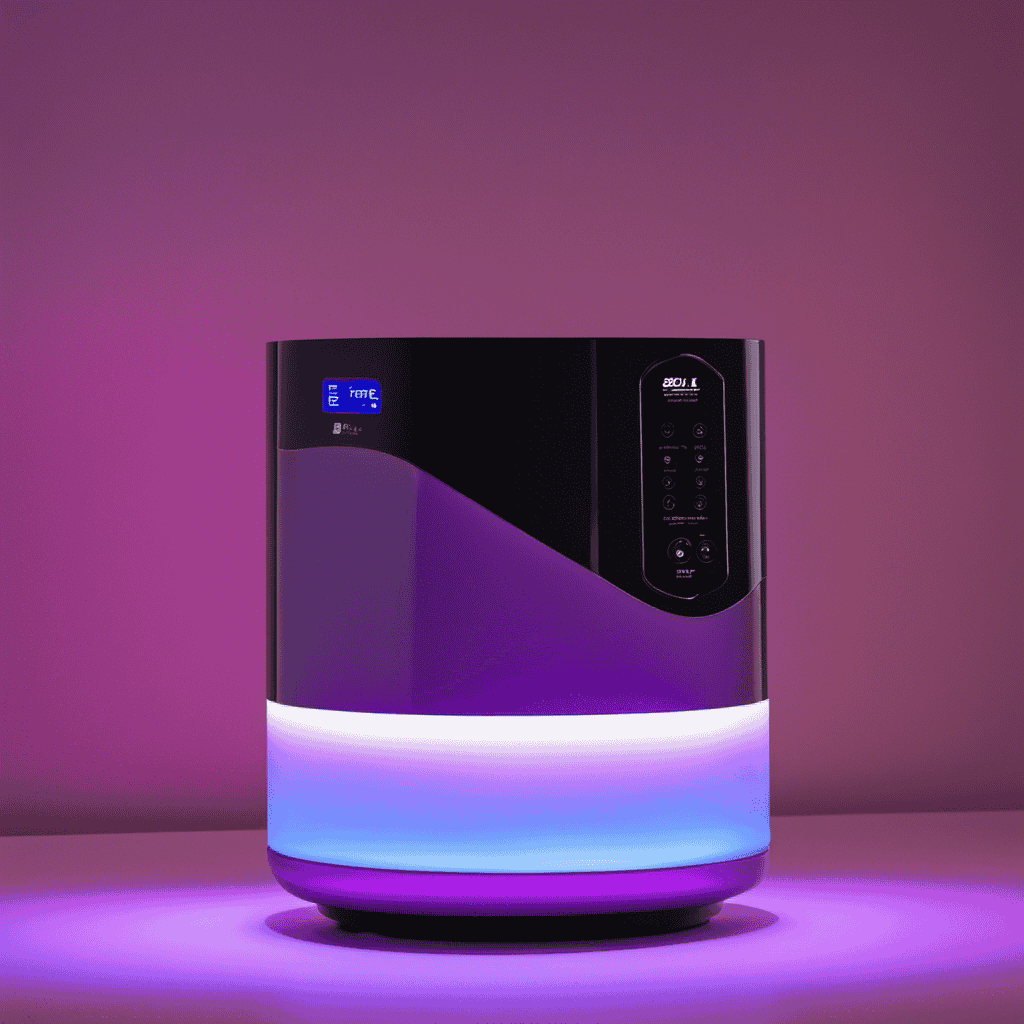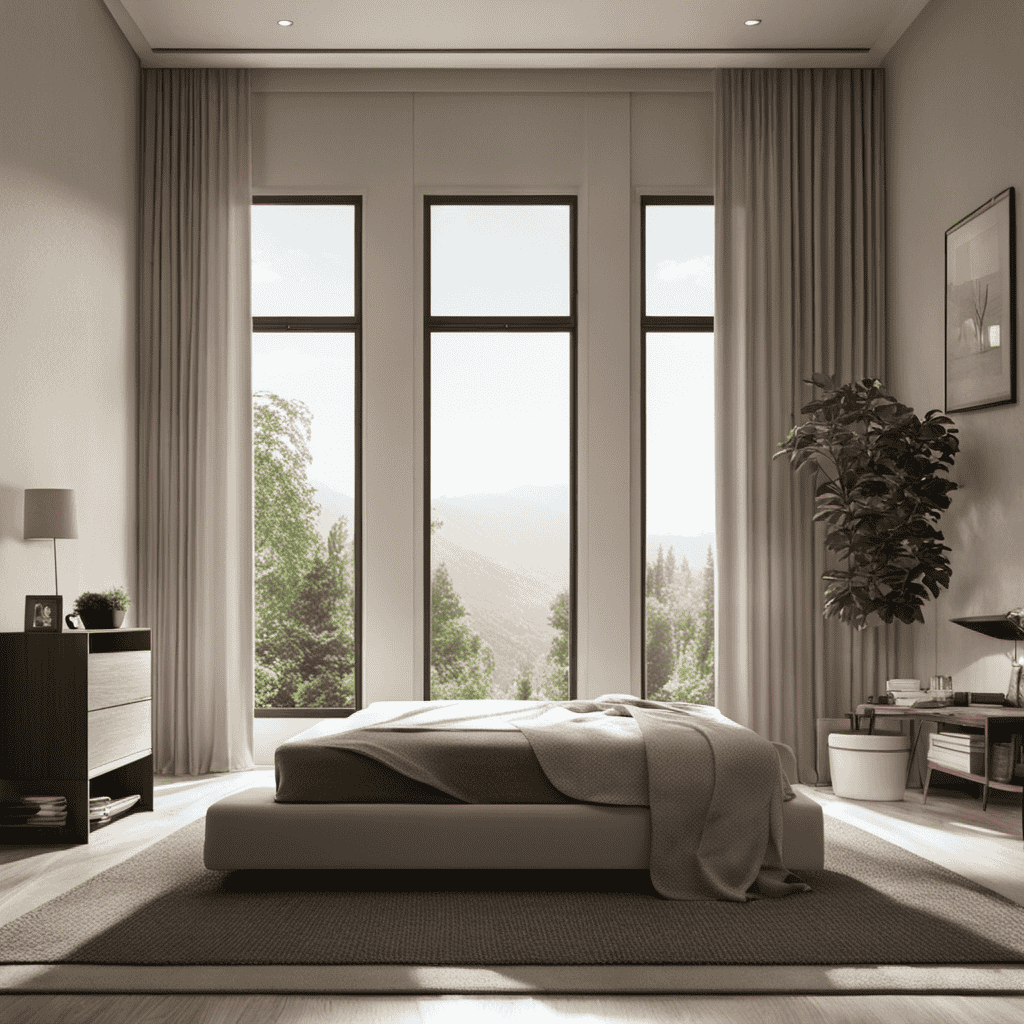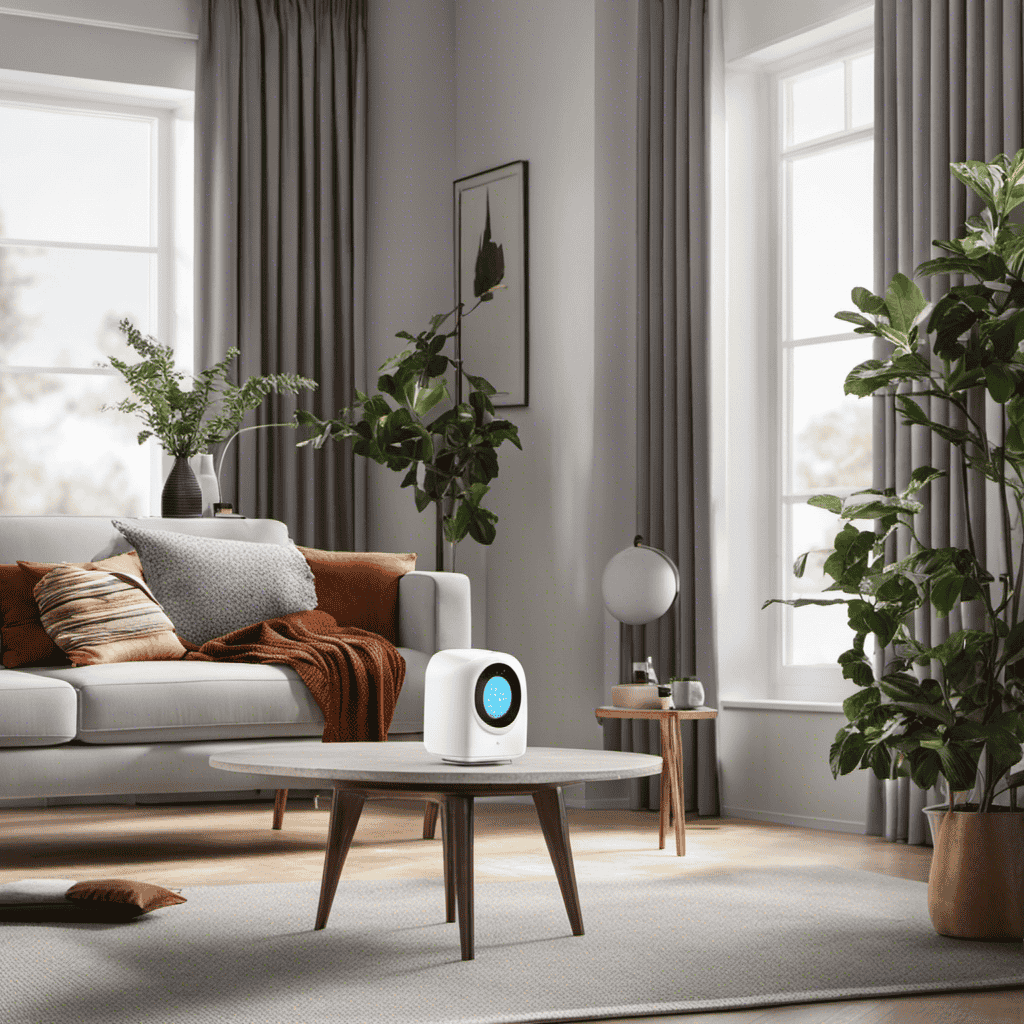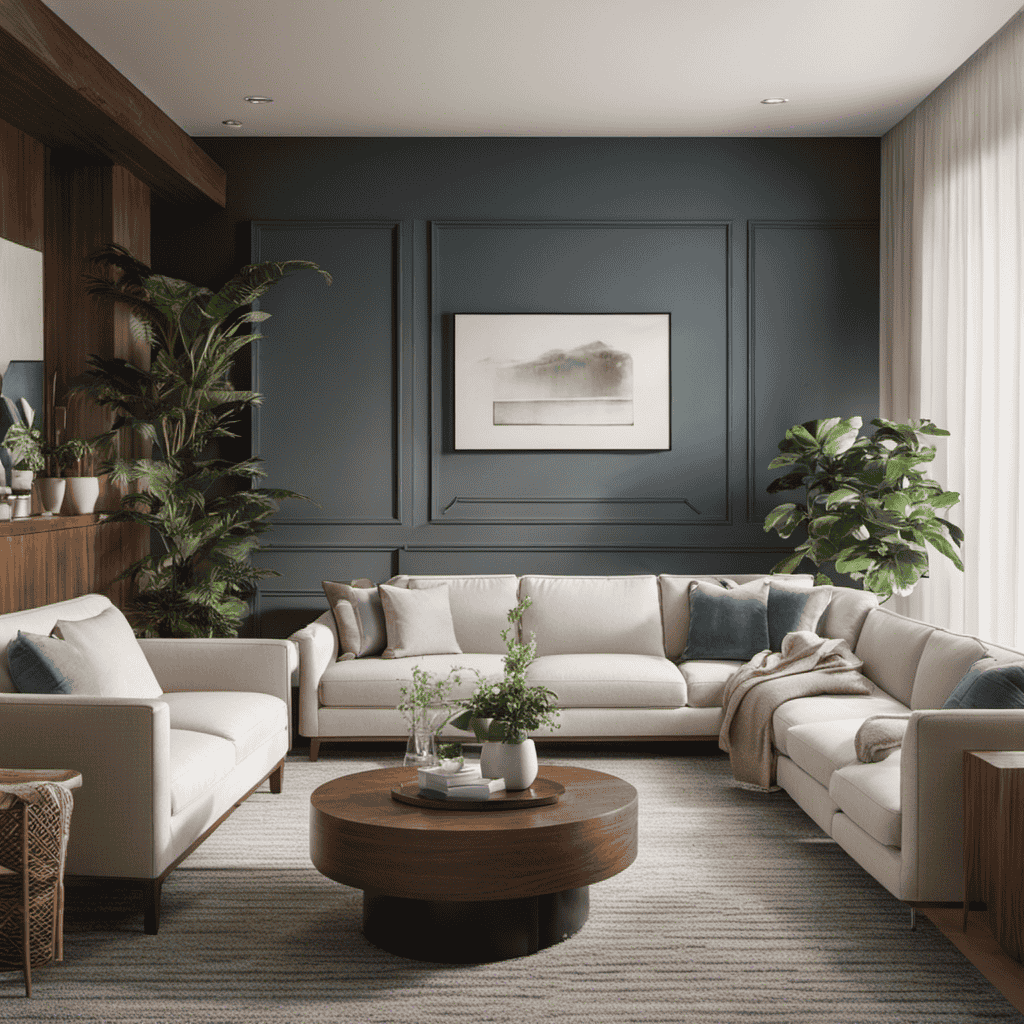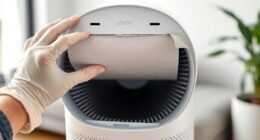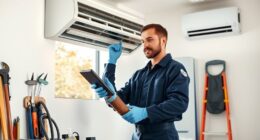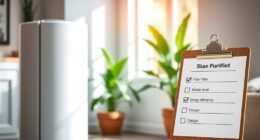Hello!
Have you ever wondered what the purpose of UV light is in an air purifier? Well, let me tell you, it’s actually pretty fascinating.
See, UV light is a powerful tool that helps to kill bacteria and viruses in the air, making it a crucial component in maintaining clean and healthy indoor environments.
But that’s not all – UV light also plays a role in preventing mold growth, eliminating odors, and filtering out harmful volatile organic compounds.
So, if you’re curious about how UV light can enhance your air quality, keep reading!
Key Takeaways
- UV light in air purifiers effectively kills bacteria and viruses, improving indoor air quality and preventing the spread of illness and allergies.
- UV light in air purifiers disrupts the DNA of mold spores, preventing their reproduction and contributing to a mold-free environment.
- UV light in air purifiers neutralizes odors, including pet odors, cooking odors, and bacterial and fungal odors, improving indoor air quality and providing a fresh and clean environment.
- UV light in air purifiers breaks down harmful volatile organic compounds (VOCs), improving overall air quality and reducing the risk of health issues caused by VOCs.
The Science Behind UV Light in Air Purifiers
UV light kills bacteria and viruses in the air, making air purifiers with UV light an effective way to improve indoor air quality. UV light’s impact on indoor air quality is significant, as it targets and eliminates harmful microorganisms that can cause illness or allergies.
The role of UV light in reducing airborne contaminants is twofold. First, it directly destroys the DNA and RNA of bacteria and viruses, rendering them inactive and unable to reproduce. This eliminates the risk of these microorganisms spreading and causing illness.
Second, UV light also helps to neutralize volatile organic compounds (VOCs) and other harmful chemicals present in the air. By breaking down these compounds, UV light further enhances the purity of the indoor air, providing a healthier environment for occupants.
How UV Light Kills Bacteria and Viruses in the Air
Using UV light in an air purifier helps eliminate bacteria and viruses in the surrounding environment. UV light’s impact on indoor air pollution is significant, as it effectively neutralizes harmful microorganisms that can cause respiratory infections. The role of UV light in preventing respiratory infections cannot be overstated, as it acts as a powerful weapon against airborne pathogens.
Here are three key ways in which UV light works to eliminate bacteria and viruses in the air:
- UV light damages the DNA or RNA of microorganisms, preventing them from reproducing and spreading.
- UV light disrupts the protein structure of bacteria and viruses, rendering them inactive and unable to cause harm.
- UV light produces ozone, a highly reactive molecule that reacts with and destroys harmful microorganisms.
UV Light as a Powerful Tool for Mold Prevention
One effective way to prevent mold growth is by utilizing an air purifier that harnesses the power of UV light. UV light effectiveness lies in its ability to disrupt the DNA of mold spores, preventing them from reproducing and ultimately eliminating them. When an air purifier equipped with UV light is turned on, the light rays penetrate the air, targeting any mold spores present. By damaging their DNA, UV light ensures that the mold spores are unable to grow and multiply, effectively preventing mold growth.
Mold prevention techniques are crucial for maintaining a healthy indoor environment, as mold can cause various health issues and damage to property. This makes UV light a valuable tool in the fight against mold and a significant contributor to maintaining a mold-free environment.
Moving forward, let’s explore the benefits of UV light in eliminating odors.
The Benefits of UV Light in Eliminating Odors
To effectively eliminate odors, you should consider harnessing the power of UV light in an air purifier. UV light has several benefits when it comes to eliminating odors, making it an essential feature to look for in an air purifier.
Here are three key benefits of UV light in odor elimination:
-
Elimination of pet odors: UV light can effectively neutralize the odor-causing molecules present in pet dander and urine. It breaks down these molecules at a molecular level, eliminating the unpleasant smell associated with pets.
-
Reduction of cooking odors: Cooking odors can linger in the air for hours, making the entire house smell. UV light helps in breaking down the volatile organic compounds (VOCs) released during cooking, effectively reducing cooking odors and improving indoor air quality.
-
Elimination of bacterial and fungal odors: UV light has germicidal properties that can kill bacteria and fungi present in the air. By neutralizing these microorganisms, UV light can eliminate the odors caused by their presence.
Incorporating UV light in your air purifier can greatly enhance its ability to eliminate odors, providing you with fresh and clean air in your home.
UV Light’s Role in Filtering Out Harmful Volatile Organic Compounds (VOCs
Incorporating UV light in an air purifier can effectively filter out harmful Volatile Organic Compounds (VOCs), improving indoor air quality. VOCs are chemicals that can be released into the air from various sources such as cleaning products, paints, and furniture. These compounds can have detrimental effects on our health, including respiratory issues and even long-term health problems. UV light plays a crucial role in air purification by breaking down these VOCs at a molecular level, rendering them harmless. The UV light reacts with the VOCs, causing a chemical reaction that breaks them down into simpler, less harmful compounds. This process helps to eliminate the presence of these harmful substances in the air we breathe. The table below provides a visual representation of the role of UV light in air purification and its impact on indoor air quality.
| UV Light’s Role in Air Purification | Impact on Indoor Air Quality |
|---|---|
| Breaks down harmful VOCs | Improves overall air quality |
| Eliminates odor-causing compounds | Reduces the risk of health issues |
| Destroys bacteria and viruses | Creates a healthier environment |
Understanding the effectiveness of UV light in reducing allergens will further enhance our understanding of how this technology can benefit our indoor air quality.
Understanding the Effectiveness of UV Light in Reducing Allergens
Understanding how effective UV light is in reducing allergens can greatly improve our knowledge of how this technology can enhance indoor air quality.
UV light has been proven to be highly effective in reducing pet dander, a common allergen that can cause respiratory issues in individuals with allergies or asthma. The impact of UV light on respiratory health is significant, as it can help eliminate pet dander particles that are often too small to be captured by traditional air filters.
By using UV light in air purifiers, we can effectively reduce the presence of pet dander in indoor spaces, leading to improved air quality and a decrease in respiratory symptoms. This technology offers a promising solution for individuals who suffer from allergies or asthma, providing them with cleaner and healthier indoor environments.
-
UV light targets and breaks down the DNA of allergens, such as pet dander, rendering them harmless.
-
UV light can penetrate deep into the air purifier, reaching areas where traditional filters may not be able to capture allergens effectively.
-
The use of UV light in air purifiers can significantly reduce the overall allergen load in indoor spaces, leading to improved respiratory health.
UV Light’s Contribution to Enhanced Air Quality and Health
Using UV light in air purifiers can effectively reduce allergens in indoor spaces, leading to improved air quality and better respiratory health. UV light’s impact on respiratory health is significant due to its ability to deactivate harmful microorganisms such as bacteria, viruses, and mold spores.
These microorganisms are common indoor air pollutants that can cause respiratory issues, allergies, and even infections. UV light works by emitting short wavelengths that penetrate the genetic material of these microorganisms, disrupting their DNA and preventing them from reproducing. By targeting these allergens and pollutants at the molecular level, UV light ensures a cleaner and healthier indoor environment.
Incorporating UV light technology in air purifiers is a proactive approach to combatting indoor air pollution and promoting respiratory wellness.
Is UV Light Effective in Purifying Air and Killing Germs in Air Purifiers?
UV light in air purifiers has been proven effective in purifying air and killing germs. The powerful UV-C light can destroy the genetic material of bacteria, viruses, and other pathogens, preventing them from reproducing and spreading. This makes UV light in air purifiers an excellent addition to any indoor environment.
Frequently Asked Questions
How Much UV Light Does an Air Purifier Need to Effectively Kill Bacteria and Viruses?
To effectively kill bacteria and viruses, an air purifier needs a sufficient amount of UV light. However, the exact amount required may vary depending on the specific model and its safety features.
Can UV Light in Air Purifiers Be Harmful to Humans?
UV light in air purifiers can have pros and cons. While it effectively kills bacteria and viruses, there are potential health risks associated with prolonged exposure. It’s important to consider these factors before using UV light in air purifiers.
Does UV Light in Air Purifiers Also Eliminate Allergens Like Dust and Pollen?
UV light in air purifiers is effective in eliminating allergens like dust and pollen, as well as mold spores and pet dander. Its impact on indoor air quality and respiratory health is significant, making it a valuable component of air purification systems.
Can UV Light in Air Purifiers Remove Cigarette Smoke and Other Strong Odors?
UV light in air purifiers is effective in removing strong odors, such as cigarette smoke. It works by breaking down the molecules responsible for the odor, providing a fresher and cleaner environment. The benefits of UV light include improved air quality and a reduction in harmful pollutants.
How Often Should the UV Light Bulb in an Air Purifier Be Replaced?
The UV light bulb in an air purifier should be replaced according to the manufacturer’s instructions. Regular replacement ensures optimal performance and effectiveness in removing airborne contaminants. UV light in air purification offers benefits such as eliminating bacteria and viruses, but safety precautions should be followed.
Conclusion
In conclusion, the utilization of UV light in air purifiers serves a vital purpose in enhancing the overall air quality and promoting a healthier environment.
By effectively eliminating harmful bacteria, viruses, mold, and odors, UV light acts as a powerful tool in maintaining a clean and fresh atmosphere.
Additionally, it aids in filtering out volatile organic compounds and reducing allergens, further contributing to a safer and more pleasant breathing experience.
The incorporation of UV light technology in air purifiers undoubtedly plays a significant role in ensuring optimal indoor air quality.
